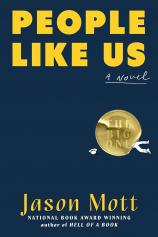People Like Us
Review
People Like Us
HELL OF A BOOK was one of my favorite books of 2021, and apparently I wasn't alone. It was the recipient of the National Book Award for Fiction that year, which is cheekily referenced throughout Jason Mott's latest effort, PEOPLE LIKE US, including on its book jacket. Although readers will delight in some callbacks to HELL OF A BOOK, this new one still can be enjoyed on its own.
One of Mott's two primary subjects, the unnamed narrator who also narrated parts of HELL OF A BOOK, refers to the award as the "N-word" or "The Big One." Much like Mott himself, this narrator, a Black man and an author, recently has been awarded The Big One for his prior novel. So he's setting out again on a bit of a victory lap book tour, this time to Europe. On the eve of his departure, though, the narrator (we'll call him "the author") is threatened by a strangely charismatic assailant. Thoroughly unsettled, the author procures a handgun, which he manages to smuggle into Europe, running afoul of several international laws.
"Jason Mott's author character might pooh-pooh the imprimatur of The Big One. But it's clear that in Mott's case, at least, the accolades are entirely justified. PEOPLE LIKE US deserves just as much fanfare as HELL OF A BOOK."
There the author discovers --- thanks in no small part to the beneficence of a French billionaire patron who effectively bribes him to abandon the United States forever --- a new kind of freedom. Sure, he's still routinely mistaken (and happy to perpetuate the error) for Ta-Nehisi Coates, Colson Whitehead or even Walter Mosley. But he also encounters a strangely unfamiliar sort of peace when he realizes that in Europe, he's unlikely to be shot and killed just as a function of the color of his skin. However, he still sometimes questions his strange visions and imaginings. And then there's that mysterious would-be killer.
Meanwhile, other chapters in PEOPLE LIKE US are told from the point of view of another author on book tour. This time it's Soot, who also appeared, as a young boy, in HELL OF A BOOK. Soot is all grown up, and it turns out that he, too, has won "The Big One." He has arrived at a college campus in frigid Minnesota in the dead of winter to give a visiting author talk. His appearance was scheduled long before a recent fatal shooting on campus, and no one (including Soot himself) is quite sure how to proceed, given the circumstances. His portions of the novel travel freely back and forth in time (mostly via his remarkably vivid memories), taking him back to times and places before his marriage ended and before his own daughter died violently.
Soot's sections, which are narrated in the third person, are more somber and pensive in tone, taking a serious approach to some of the same themes and topics that are tackled with the author's characteristic bombast in his first-person portions. These parts, so contrasting in tone, weave back and forth against each other in ways both playful and profound, their parallels and intersections sometimes subtle and sometimes more intentionally obvious.
The novel's title phrase, "people like us," is one of its recurring motifs, particularly in the author's sections. The ways in which the phrase is repeatedly used, by different speakers and in different situations, to denote shared group identity of various kinds --- Americans in Europe, creative people, Black artists, Black people more generally --- become almost like a kind of refrain, a coded way of indicating both belonging and exclusion.
Jason Mott's author character might pooh-pooh the imprimatur of The Big One. But it's clear that in Mott's case, at least, the accolades are entirely justified. PEOPLE LIKE US deserves just as much fanfare as HELL OF A BOOK.
Reviewed by Norah Piehl on August 14, 2025
People Like Us
- Publication Date: August 5, 2025
- Genres: Fiction
- Hardcover: 288 pages
- Publisher: Dutton
- ISBN-10: N/A
- ISBN-13: 9798217047116




